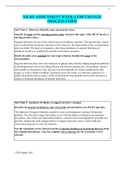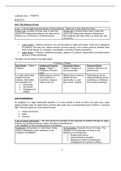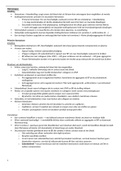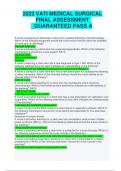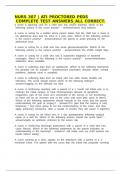Immunology les 11 16/12/2019 Heeringa
Dia 1 Humoral immunity against microbial toxins immunity can be transferred by serum
from an infected individual to a naïve individual. Jules Bordet showed that in addition to this
serum factor ( antibodies), serum also contains heat labile proteins that assist
(complements) in the lytic function of antibodies (complement system).
Effector mechanisms of humoral immunity the defense against extracellular pathogens
and microbial toxins.
Dia 2 Antibodies (produced by plasma cells) are the humoral part of
the adaptive immune system.
Complement system is the humoral part of the innate immune system.
Dia 3 More than 100 years ago serum (passive immune) therapy
was found out, and thus antibodies were exploited therapeutically to protect us against
infections.
Dia 4 Now powerful biologics (antibodies!!) that e.g. attenuate effector responses in the
kidney, activate the immune system to eliminate tumor cells or that can be custom
engineered (because of this, antibodies can be used as therapeutics).
Dia 7 Which cells produce antibodies plasma cells (B cells can be naïve, once they get
stimulated with antigens they proliferate and differentiate to e.g. plasma cells which
produce the antibodies).
Where are these cells activated lymph node
Where is the majority of antibody produced bone marrow, secondary lymphoid organs
(antibodies produced by B cells can act in distance, they can go in the blood stream and
confer their functions at distance sites).
dia 9 During a primary immune response, you will develop antibodies (mostly IgM isotype,
lower in affinity and more variable) but it is not as effective as the immune response that
you will get after a secondary response (higher magnitude of response, affinity of the
antibodies will be better).
Dia 10 Antibodies or immunoglobulins are specific glycoproteins induced by B
cells (plasma cells) in response to a specific antigen and capable of reacting with
that antigen.
Antigen = anti body generator
Epiptope = the specific target of the antigen against which an individual antibody
binds (about six amino acids in length).
Dia 11 Antibodies are bifunctional proteins:
- They must recognize an infinite number of antigens ( antigen recognition).
- At the same time, they must also interact with a limited number of specialized
molecules (e.g. Fc receptors on leukocytes (bind the constant part of an antibody)
and they can also activate complement) ( stimulating effector mechanisms).
, Dia 13 Antibodies structure most effector functions of antibodies are mediated by the Ig
heavy chain (Fc) but it requires antibody binding of antigen to the variable regions. This
ensures that antibody effector pathways are activated only when needed. The Fc (constant)
region is common irrespective of the antigen specificity is common for specific isotypes of
antibodies and confers the effector functions of antibodies.
Dia 14 Plasma cells reside in the bone marrow or in the secondary lymphoid organs (they
produce the antibodies here), but the effect is at a distant site. Antibodies are guided
missiles with extraordinary precision and targeting abilities. They are antigen specific but
perform their effector functions at sites distant from their production.
Dia 15 Antibodies can have different isotypes and thus different functions in the immune
system. IgG probably most produced antibodies. They are important for effector
functions like opsonization, complement activation etc. they also give negative feedback to
the B cells for antibody production. Many of the effector functions of antibodies are
mediated by the heavy chain constant region. Different immunoglobulin heavy chain
isotypes serve distinct effector functions. Different microbes stimulate B cell isotype
switching to the Ig isotypes best for eliminating these microbes.
Dia 16 Antibodies protect by recruiting other effector functions through interactions with Fc
receptors and other proteins of the immune system. Antibody mediated elimination of
antigens involves a number of effector mechanisms. There are various cellular and humoral
components of the immune system that participate in the effector functions.
Effector functions:
1. Neutralization of microbes and toxins
2. Opsonization and phagocytosis of microbes
3. Antibody-dependent cellular cytotoxicity
Dia 17/18
1 Neutralization of microbes and toxins.
We can be infected by a lot of different pathogens. Many of these
pathogens produce toxins that affect physiological processes. A
humoral response is aiming to neutralize the effects of these toxins.
Antibodies against microbes can block infectivity and neutralize the
harmful effects of microbial toxins. It requires only the antigen binding
part (not the Fc tail) of the antibody and thus can be mediated by any
isotype. High affinity antibodies are most efficient.
Dia 19 Neutralizing antibody mediated humoral immunity is very important part of the
vaccine response nowadays.
Dia 21
2 Opsonization and phagocytosis of microbes
Opsonin is a molecule that enhances phagocytosis by marking a microbe.
Dia 1 Humoral immunity against microbial toxins immunity can be transferred by serum
from an infected individual to a naïve individual. Jules Bordet showed that in addition to this
serum factor ( antibodies), serum also contains heat labile proteins that assist
(complements) in the lytic function of antibodies (complement system).
Effector mechanisms of humoral immunity the defense against extracellular pathogens
and microbial toxins.
Dia 2 Antibodies (produced by plasma cells) are the humoral part of
the adaptive immune system.
Complement system is the humoral part of the innate immune system.
Dia 3 More than 100 years ago serum (passive immune) therapy
was found out, and thus antibodies were exploited therapeutically to protect us against
infections.
Dia 4 Now powerful biologics (antibodies!!) that e.g. attenuate effector responses in the
kidney, activate the immune system to eliminate tumor cells or that can be custom
engineered (because of this, antibodies can be used as therapeutics).
Dia 7 Which cells produce antibodies plasma cells (B cells can be naïve, once they get
stimulated with antigens they proliferate and differentiate to e.g. plasma cells which
produce the antibodies).
Where are these cells activated lymph node
Where is the majority of antibody produced bone marrow, secondary lymphoid organs
(antibodies produced by B cells can act in distance, they can go in the blood stream and
confer their functions at distance sites).
dia 9 During a primary immune response, you will develop antibodies (mostly IgM isotype,
lower in affinity and more variable) but it is not as effective as the immune response that
you will get after a secondary response (higher magnitude of response, affinity of the
antibodies will be better).
Dia 10 Antibodies or immunoglobulins are specific glycoproteins induced by B
cells (plasma cells) in response to a specific antigen and capable of reacting with
that antigen.
Antigen = anti body generator
Epiptope = the specific target of the antigen against which an individual antibody
binds (about six amino acids in length).
Dia 11 Antibodies are bifunctional proteins:
- They must recognize an infinite number of antigens ( antigen recognition).
- At the same time, they must also interact with a limited number of specialized
molecules (e.g. Fc receptors on leukocytes (bind the constant part of an antibody)
and they can also activate complement) ( stimulating effector mechanisms).
, Dia 13 Antibodies structure most effector functions of antibodies are mediated by the Ig
heavy chain (Fc) but it requires antibody binding of antigen to the variable regions. This
ensures that antibody effector pathways are activated only when needed. The Fc (constant)
region is common irrespective of the antigen specificity is common for specific isotypes of
antibodies and confers the effector functions of antibodies.
Dia 14 Plasma cells reside in the bone marrow or in the secondary lymphoid organs (they
produce the antibodies here), but the effect is at a distant site. Antibodies are guided
missiles with extraordinary precision and targeting abilities. They are antigen specific but
perform their effector functions at sites distant from their production.
Dia 15 Antibodies can have different isotypes and thus different functions in the immune
system. IgG probably most produced antibodies. They are important for effector
functions like opsonization, complement activation etc. they also give negative feedback to
the B cells for antibody production. Many of the effector functions of antibodies are
mediated by the heavy chain constant region. Different immunoglobulin heavy chain
isotypes serve distinct effector functions. Different microbes stimulate B cell isotype
switching to the Ig isotypes best for eliminating these microbes.
Dia 16 Antibodies protect by recruiting other effector functions through interactions with Fc
receptors and other proteins of the immune system. Antibody mediated elimination of
antigens involves a number of effector mechanisms. There are various cellular and humoral
components of the immune system that participate in the effector functions.
Effector functions:
1. Neutralization of microbes and toxins
2. Opsonization and phagocytosis of microbes
3. Antibody-dependent cellular cytotoxicity
Dia 17/18
1 Neutralization of microbes and toxins.
We can be infected by a lot of different pathogens. Many of these
pathogens produce toxins that affect physiological processes. A
humoral response is aiming to neutralize the effects of these toxins.
Antibodies against microbes can block infectivity and neutralize the
harmful effects of microbial toxins. It requires only the antigen binding
part (not the Fc tail) of the antibody and thus can be mediated by any
isotype. High affinity antibodies are most efficient.
Dia 19 Neutralizing antibody mediated humoral immunity is very important part of the
vaccine response nowadays.
Dia 21
2 Opsonization and phagocytosis of microbes
Opsonin is a molecule that enhances phagocytosis by marking a microbe.

